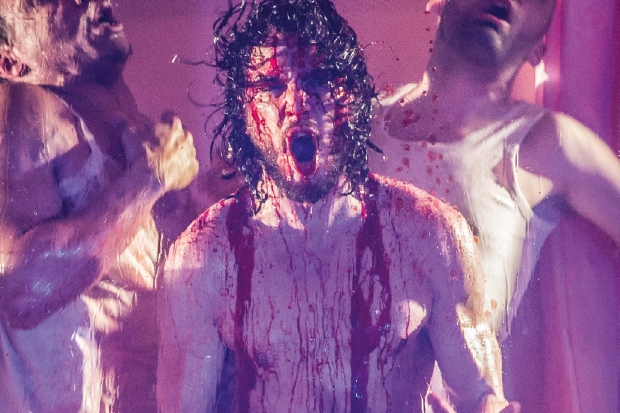Great excitement for play-goers as a rare version of a theological masterpiece arrives in the West End. Doctor Faustus stars Kit Harington, a handsome, bearded bantamweight with round glasses and rock-star curls. We first meet him wearing a grey hoodie and lounging in a bedsit surrounded by cheap Catholic statuary. The druggy clothes and the religious iconography suggest a criminal Jesus-freak, possibly of Mexican origin, hiding out from cocaine dealers. Marlowe’s creation is somewhat different. Dr Faustus is a medieval potentate, a scholar of genius, a rich and celebrated German polymath admired by emperors and cardinals, who decides to exchange his earthly ambitions for the chance to wield supernatural powers for 24 years. But hell awaits him when the contract expires.
It’s an amazing story told by a playwright reaching a pitch of rhetorical magnificence attained by no other English dramatist, bar Shakespeare, and to stick the whole shebang in a crummy old flat suggests either wilful vandalism or culpable lethargy. The show’s creators, Jamie Lloyd and Colin Teevan, seem not to understand the play at all, still less to trust audiences to understand it. Faustus’s squat is populated by semi-naked actors leering out from the shadowy alcoves. One is a skinhead in a negligee. Another wears a string vest. A woman with an exposed teat glares at us with sulky accusation. Mephistopheles appears in an unwashed pinny. These figures represent demons and fallen angels on a temporary visit to the mortal world but they all sport unflattering nylon underwear, chewing-gum grey, drawn apparently from a catalogue of 1970s pants.
The result would be hilarious if it weren’t so pious and stagey. An anxious couple enter, stark naked, looking like Adam and Eve caught dogging at Redcar services. I doubt if I’ve ever seen a classic play mounted with so little connection to its original text. A nudist with an Irish accent walks in and buggers a goblin to indicate that he’s a nasty sort of chap. His name happens to be Satan but the word evidently carries no connotation of evil for a modern audience, so the sodomistic rape is added in the interests of clarity. Otherwise we might think he was Francis of Assisi or Bob Geldof. The daft anachronisms of the opening scenes can’t fully obscure the rough-hewn grandeur of Marlowe’s verse but the play’s motifs of vanity and megalomania are left unilluminated because the ground plan is illiterate. The play’s middle section consists of anti-papal slapstick, which is often altered or dropped. Here the replacement is a modern romance which functions quite well because the dialogue and the design are on friendly terms and not fighting each other across a gulf of 450 years.
But the drama lacks meat. Faustus has become a needy superstar with a feeble crush on his personal assistant, Grace Wagner. ‘Am I shallow?’ he wheedles at her. The closing scenes return to Marlowe’s original as Faustus contemplates the surrender of his diabolical powers. Conjuring up Helen of Troy’s spirit he delivers his monumental final words to antiquity’s paragon of erotic desire. ‘Sweet Helen, make me immortal with a kiss/ Her lips suck forth my soul, see where it flies.’ The sublime text is enlivened, perhaps unnecessarily, by a new piece of stage business as Faustus picks up a vegetable knife, stabs Helen in the kidneys, and humps her to death like a triumphant gorilla as her guts spill out over the mattress. I predict a box-office triumph for this shrill, muddled nonsense.
Around me smitten women in spectacles clutched at their handbags as Harington strutted and paraded before them, partially disrobed. At one point he turned his back and mooned at the dress circle. This seemed to be just what the dress circle wanted. The show is a literary lap dance rather than an encounter with an Elizabethan masterpiece and the fans will find all their desires met and their expectations satisfied. Marlovians, look elsewhere.
The Suicide by Nicolai Erdman is an ingenious satire written in Russia in 1928. A depressed citizen informs his neighbours that he plans to top himself, but rather than dissuading him they decide to profit from his early demise. ‘I’d do the same,’ says an intellectual, ‘but I’m needed.’ Suhayla El-Bushra has transposed this macabre sketch to inner-city London. The action opens as a tepid, sweary soap opera but it rapidly finds its feet and becomes a smart contemporary spoof executed with lots of verve and inventiveness. Sam, a jobless wannabe, is filmed contemplating a death leap from the roof of his towerblock. The clip goes viral. Greedy locals pounce. Politicians demand government action. A performance poet bursts into song. A thuggish media type (an outstanding Paul Kaye) hopes to turn Sam’s death into the birth of his film career. A rackety slice of brilliant satirical fun.







Comments